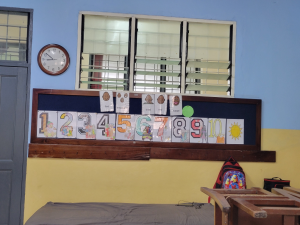June 27th: We had our final two lectures at University of Ghana in Accra. Women in Public Life in Ghana presented by Akosua K. Darkwah, PhD, Department of Sociology, University of Ghana. This lecture was conducted by one of only two women who provided lectures to us while we were here. Women contribute at high numbers to Agriculture (41.4% women and 48.2% men), Manufacturing (10.3% Females and 7.7% Males) and Services (28.0% women and 10.3% Males) in Ghana.
The second and final lecture was entitled, Agriculture in Ghana and was conducted by Dr. Naalamie Amissah, PhD. Ghana gained its independence on March 6, 1957, has a population of 30.9 million (2021), has a population growth rate of 2.1% per annum, the capital is Accra and the current President is Nana Akufo-Addo.
Principle Agricultural Exports include: Cocoa, Timber, Horticultural Products, Fish/Sea Foods and their Cultural Agricultural Imports include: Wheat, RIce, Chicken (frozen), Milk and Fish.
June 28th: Today we had a lecture on solid waste management, climate change, and environmental issues in Ghana. Afterward, we visited a waste management facility and watched videos on the processes that occur daily. The plant was under construction, but we were able to view a 3D model of it.
June 29th: Today we went to our site, Glowna. We worked with the children today on prime numbers. We wrote problems on the board and walked around and assisted them when needed and checked over their work. They came up and worked each problem out on the board in front of the class, to ensure they grasped the concept and were able to explain their answers. Lastly, we ended the day by playing a game of Uno.
 June 30th: On Thursday, we went to the Art Center. We shopped till we dropped, the market was an amazing experience. It was very fun to look around and see all of the various items people were selling and getting to bargain. Then, we went to our volunteer sites for the last time. It was bittersweet, as we have formed bonds with the children.
June 30th: On Thursday, we went to the Art Center. We shopped till we dropped, the market was an amazing experience. It was very fun to look around and see all of the various items people were selling and getting to bargain. Then, we went to our volunteer sites for the last time. It was bittersweet, as we have formed bonds with the children.
July 1st: Friday was mainly our travel day from Accra to Kumasi. Five hours on the bus! We stopped at the Ghana National Cultural Centre. We learned all about the various tribes, former chiefs, the former currency used, tribal drums, and more. Very grateful for the chance to learn more about Ghanaian culture.
July 2nd: On Saturday, we spent the day in Kumasi. Around 8:30 am we left our hotel for a day full of activities. The first thing that we did was visit a Kente Weaving Village to learn about how kente clothing and cloth are made. We got to have a demonstration of how weaving is done and some of us also got to try weaving for ourselves. After we finished there, we went on our way to learn how people create clothing with traditional Ghanian Adinkra symbols by printing them on fabric. We saw a demonstration of how they make the dye that’s used to print the symbols onto the cloth, and some of us even got to give printing a try. After that, we went on our way to the Kumasi Fort and Military Museum for a tour. We learned about the Asante Rebellion and got to see some of the main military equipment and artifacts from the British-Asante war of 1990. And for our final stop of the day, we visited the Okomfo Anokye Sword Site to learn about the ‘immovable’ sword that was driven into the ground by Okomfo Anokye, the history of the Asante people, and why this sword is monumental to them.
-Rayn Robinson

